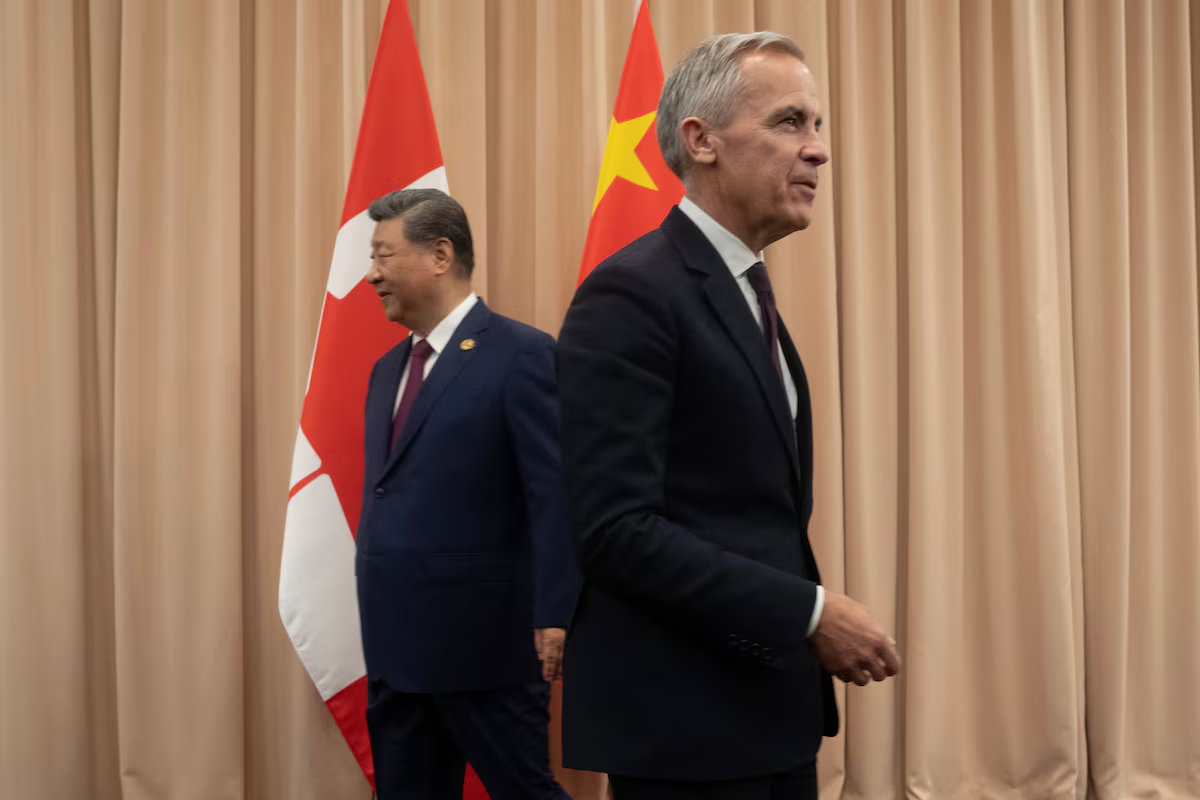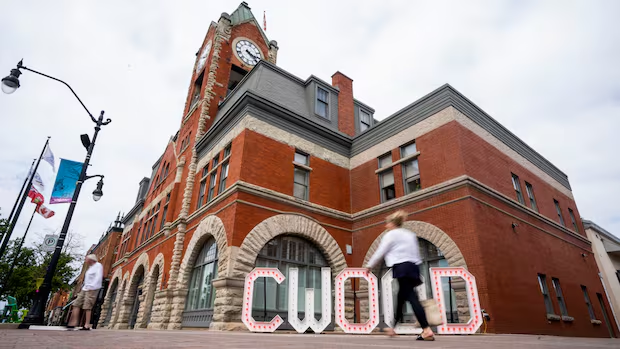Carney says he raised foreign interference with Xi

Open this photo in gallery:
Prime Minister Mark Carney and Chinese President Xi Jinping make their way to their seats after shaking hands at the start of a meeting in Gyeongju on Friday.Adrian Wyld/The Canadian Press
Prime Minister Mark Carney said he raised Chinese foreign interference in Canada during his first meeting with President Xi Jinping, adding Beijing doesn’t understand the degree of concern among Canadians about the issue.
Speaking to reporters at the Asia-Pacific Economic Cooperation summit, Mr. Carney also defended the lack of announcements or resolutions to an ongoing trade war with China that is hurting Canadian farmers and fishermen.
Mr. Carney and Mr. Xi met Friday at APEC for nearly 40 minutes. It was the first formal meeting between a Canadian prime minister and the Chinese President in eight years.
Carney accepts Xi’s invitation to visit China as leaders meet in South Korea
Canada is seeking new markets for exports to offset the damage that U.S. President Donald Trump’s tariffs are doing to the Canadian economy.
While he discussed foreign interference with the Chinese President, Mr. Carney said: “I don’t think they recognize the level of concerns we have about these issues.”
He said Canada and China will agree to disagree on some matters. “Where we can find common ground, we’ll find common ground, and where we have differences – and there are big differences in our societies – our governments will respect those.”
His predecessor Justin Trudeau launched a public inquiry into foreign interference by countries such as China following reporting from the Globe and Mail and other media on efforts by Beijing to meddle in Canada.
Mr. Carney, who Friday accepted an invitation from Mr. Xi to visit China, emerged from the meeting without concrete results.
He said the meeting was meant to rebuild ties.
“What the meeting accomplished, which was the objective of the meeting, was to establish that relationship at the highest level for the first time in eight years,” Mr. Carney said.
He said the tête-à-tête has set in motion efforts to resolve the trade dispute.
“Those are important issues for us, and the instruction of officials and ministers to work, on both sides, to find resolution for those is something that comes out of that meeting, at that level, in that system,” Mr. Carney said.
The meeting, which he said both sides are calling a “turning point” in relations, has unlocked a track to resolve the dispute that’s affecting farmers in industries from canola to peas to pork as well as Canada’s seafood industry.
He said the meeting has opened “a pathway” to address the tariffs that China has on Canadian farmers and fisherman “and we’re going to be working hard to get those resolved and move forward.”
Relations with China entered a deep freeze in 2018 after Canada arrested a Huawei executive on a U.S. extradition request and Beijing responded by jailing two Canadians.
Over the years that followed the former Trudeau government blocked Huawei gear from Canada’s wireless sector, barred major takeovers by Chinese firms and restricted academic co-operation with universities in China.
Asked if he would revisit restrictions that Canada has placed on Chinese investment, Mr. Carney wouldn’t say.
“I think the expectation from President Xi, and Premier Li from the Chinese side, is to be clear what are the areas where we can co-operate, and what are the areas where we wouldn’t,” he said. “What are the sensitive areas in terms of inbound investment from China.”
He suggested Canada could use Chinese investment in renewable energy as well as battery storage.
“Some of the most competitive companies in the world are Chinese, in both offshore wind and in battery storage. It’s a natural potential area for co-operation.”
The Carney-Xi meeting, at nearly 40 minutes, was far shorter than a Thursday meeting at the summit between Mr. Trump and Mr. Xi, which lasted about 90 minutes.
Trump leaves APEC early, ceding spotlight to China
Canada imposed a 100-per-cent tariff on Chinese electric vehicles last year in tandem with the former Biden administration, as well as a 25-per-cent levy on steel and aluminum from China. Beijing retaliated with tariffs on Canadian canola oil, canola meal, peas and Canadian seafood and pork products. It ratcheted up the pressure in August by imposing a duty of more than 75 per cent on Canadian canola seed, a major crop in Alberta, Saskatchewan and Manitoba.
Greig Mordue, a McMaster professor of engineering who formerly worked at Toyota Canada, said Chinese automakers could be interested in establishing vehicle assembly in Canada if the opportunity is right. They could consider taking over facilities abandoned by the Detroit Big Three and would also need to have an export strategy for some production to a market such as the European Union.
He said Canada could use a duty-remission program that balanced reduce tariffs on Chinese electric vehicle imports in return for firm investments in Canadian manufacturing. Canada used the same mechanism to entice Japanese auto production here.





